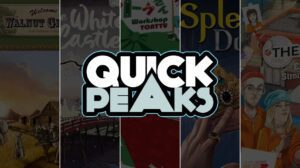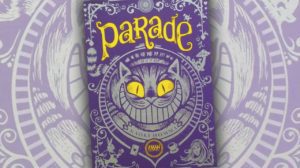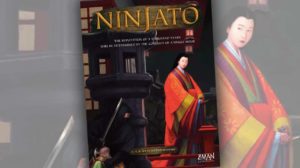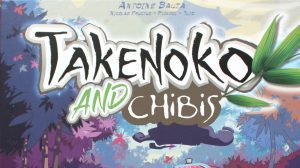Disclosure: Meeple Mountain received a free copy of this product in exchange for an honest, unbiased review. This review is not intended to be an endorsement.
I can’t verify the statistics, but I would guess Trivial Pursuit was one of the two or three most-played board games of my childhood. The 1981 blue Genus Edition, as I recall, was the mainstay. It was my mom’s favorite game. She read incessantly and was a dominant force navigating the pie. Of course, as wee little ones, my sister and I would play along using the cards from Trivia for Kids, a 1984 release from Whitehall Games. The six categories matched and the subject matter gave us a fighting chance until we were old enough to engage the real deal. We never won, but it was fun to stand at the foot of the mountain and dream.
I’ve not challenged my mom to revisit her old stomping grounds in years. After a few decades reading on my own, I just don’t find myself particularly drawn to trivia games. Maybe it was all the losing. Who knows? Maybe my entire reading adulthood has been fueled on a psychological level by repeatedly staring at those missing slices of trivia pie before I was ten years old.
I share this mildly unsettling context because I recently found myself instantly and inexplicably attracted to League of the Lexicon, a 2022 release from Two Brothers Games. Deemed a game “by word lovers, for word lovers,” this particular title glories in its linguistic supremacy.
It has fancy artwork (where there’s artwork), fancy subject matter, a fancy rulebook, and a fancy box that smacks of the intimidating blue box of my childhood. It’s a trivia game, yes, but I want to play (with) it. I’m so confused.
A skinny sumo wrestler is not ironic, he’s just going to lose
Each player takes a Character card. Each Character card has a row of six symbols across the bottom, indicating the Artefacts that must be collected in order to win. There are 45 Artefact cards, each containing one of ten symbols in the game. Players roll a six-sided die to determine their category. If they answer correctly, they draw an Artefact card, hoping for a match. Two mismatched Artefacts may be traded for another draw. Three mismatched Artefacts can take the place of one missing Artefact in the collection. When a player collects all their Artefact symbols, they face a Decider question to win.
![]()
There are five categories of questions. The sixth side of the die is treated as a wild.
- Lexicon Master features synonyms, antonyms, categories, and compounds
- Meaning and More features definitions, odd-one-out, and archaic words
- Usage and Abusage features mistaken identity, grammar, and spelling
- Word Source features origin stories of words and phrases
- Wordly Wisdom is a potpourri category
There are one hundred Ticklish questions and three hundred more challenging Tricksy questions. The cards are stored in three tuck boxes. The die has a cardboard riser to elevate it in the box and keep it from rolling around. The box bottom is doubled so that the lid remains partially raised for a contoured profile. Everything is sustainable. Everything is pretty.
An ugly baby is not ironic, it’s just hard to look at
I wonder if it’s ironic that I’ve not played an actual game of League of the Lexicon yet?
I was fairly certain of two things when I set out to review this game. First, I was sure that I would have a hard time getting a group on board to play a game according to the rules. Trivia games, as I said, are not common visitors to our table. But second, and more importantly, I was sure that everyone I know would enjoy exploring the questions casually. I was correct on both counts.
![]()
We have kept League of the Lexicon on the mantle for the last month. It looks good there. It has been at the ready for impromptu sessions of questions and answers. When the mood strikes—with the family or with guests—we bust out a stack of cards, split into teams without even thinking or realizing, and play (with) the game. We roll the dice, tinker with the Artefact cards, and either keep a score for bragging rights or fiddle until the conversation slows and we move onto another activity.
The back of the rulebook suggests six variants to the base rules. The variants communicate a singular message to my ears: go ahead and enjoy this box any way you’d like. Play as one big team. Just play and collect Artefacts until they’re gone (45-ish questions). Play solo. Dig in your heels and play an even longer and meaner version of the full ruleset. It really doesn’t matter. The joy of this one is in the love of words and the best way to dabble with language.
I feel I must address the physical box and its contents to make this review more like a review. The card quality is good, not great. But there are 400 large trivia cards—I would hardly expect a linen finish. The tuck boxes are too tight to be highly functional. I stopped trying to close them. I simply fold them over and close the big box to avoid the inevitable damage (to the box and the cards) of opening and closing all the time. The die is wooden. It works. It all works. As I said, it’s a looker on the shelf. There’s a lot of love in this title.
![]()
Recently Andrew Holmes reviewed 21x, a card game of algebraic functions that inspired an apt summative thought: as a plaything, this product is outstanding. Regardless of your view of trivia games, League of the Lexicon is an amazing purchase. The questions have come from lexicographers and scholars around the world. It is a truly remarkable collection of fascinating tidbits that are sure to stimulate a few lively conversations around the origin of the name ‘A1 Steak Sauce’ and the occasional humorous frustration that comes from the inability to think of a tenth method for cooking an egg. If you play long enough, you’ll find out who Hoyle was and where the word ‘emoji’ was born. You don’t have to play to love this one.
But you do have to speak English. This is, perhaps, the most language dependent game ever created. If you love it, though, you just might find your way to hunting down the smaller box Slang Edition or the Global Edition that accompanied the Kickstarter release.
League of the Lexicon is undeniably Trivial Pursuit-ish. But for this reader, it comes with all the childlike curiosity and none of the childhood intimidation. Use it any way you like, but if you’re even mildly curious, I think you’ll find a healthy dose of delight in this blue box.










Add Comment